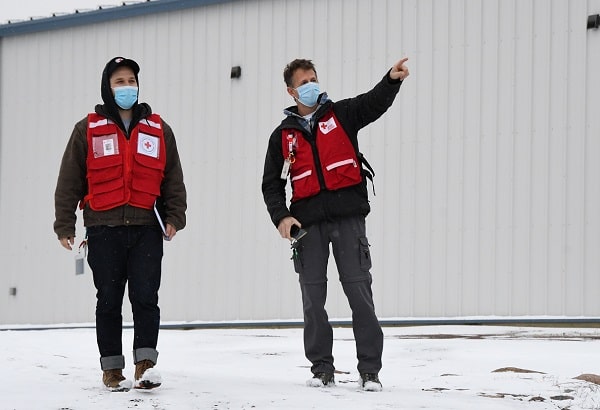Canada:

In response to the second wave of the COVID-19 pandemic, the Canadian Red Cross is continuing to build its capacity to help meet needs across the country. There are many ways for people to get involved such as becoming a volunteer, employee, delegate, or taking on a new role as a ‘reservist’. Reservist positions are for people willing to commit to being on standby for a month with the expectation that they could be asked to deploy at a moment’s notice. Learn more about some of these positions here.
Honduras

Following the consecutive devastating impacts of Hurricanes Eta and Iota, the Canadian Red Cross, with the support of the Government of Canada, sent an emergency health clinic to La Lima, Honduras one of the areas most affected by the disaster. Working alongside the Honduran Red Cross and Ministry of Health, the clinic is now seeing patients and can provide treatment for common infections, chronic diseases, minor trauma and wounds, basic prenatal care and psychosocial support. The team is also monitoring for outbreaks and working to ensure the protection of women and children. Find out more about the situation on the ground here.
Bangladesh

In the above photo, members of the Bangladesh Red Crescent Society celebrate Global Handwashing Day, an event made all the more important during the COVID-19 pandemic. At the Canadian Red Cross-supported health post and community centre, participants were given demonstrations on proper hand hygiene and provided with soap to take home. Proper handwashing is seen as one of the most effective ways to stop the spread of the virus.
South Sudan

In South Sudan, the collective impact of climate change, COVID-19 and conflict mean that the situation is especially worrying for women and girls. They face additional hardships from the pandemic – including increases in sexual and gender-based violence (SGBV), early/forced marriages, domestic violence or denial of access to sexual and reproductive health services. The South Sudan Red Cross, with support from the Canadian Red Cross, has rolled out an online training for volunteers and staff on SGBV, prevention and response to sexual exploitation and abuse (PSEA), as well as child protection. Following the training, the team will reach out to the communities through awareness campaigns and messages.
Namibia

Following a COVID-19 outbreak at a secondary school, the Namibia Red Cross Society distributed hand washing stations, sanitizers, and personal protective equipment to the Ministry of Education, Arts and Culture. They are also working to support thousands of households in the highest risk areas by providing information on COVID-19 with a focus on the impact the virus has on sexual and reproductive health, gender-based violence and people with HIV.
Occupied Palestinian territories

As a vital part of the health system, the Palestine Red Crescent Society is transporting patients who may have COVID-19 to local hospitals, as well as providing other medical services through their mobile clinics, healthcare centres and community health teams. They are also conducting home visits with elderly and vulnerable people, raising awareness about COVID-19, distributing hygiene parcels to those in need, and offering psychosocial support. Ongoing physiotherapy and rehabilitation services have been adapted for the pandemic and inclusive programs for the hearing impaired remain active through remote learning.
Sri Lanka

With children returning to school, the Sri Lanka Red Cross Society has been hosting training sessions for students and staff on the importance of hand hygiene and reducing the risk of COVID-19 transmission. Over 120 schools across the country have received this training, with many being given handwashing stations as well. The Sri Lanka Red Cross Society is also a key partner with the Ministry of Health in providing COVID-19 testing capabilities.
Serbia

Staff and volunteers from the Red Cross of Serbia are setting up tents and other temporary facilities across the country for triage and examining patients as the medical system struggles to meet the needs created by COVID-19. More than 43,000 people have received treatment in these alternative care centres. They are also providing psychosocial support through national and local phone lines as well as by text for those with hearing impairments or in vulnerable circumstances.
Related stories:

